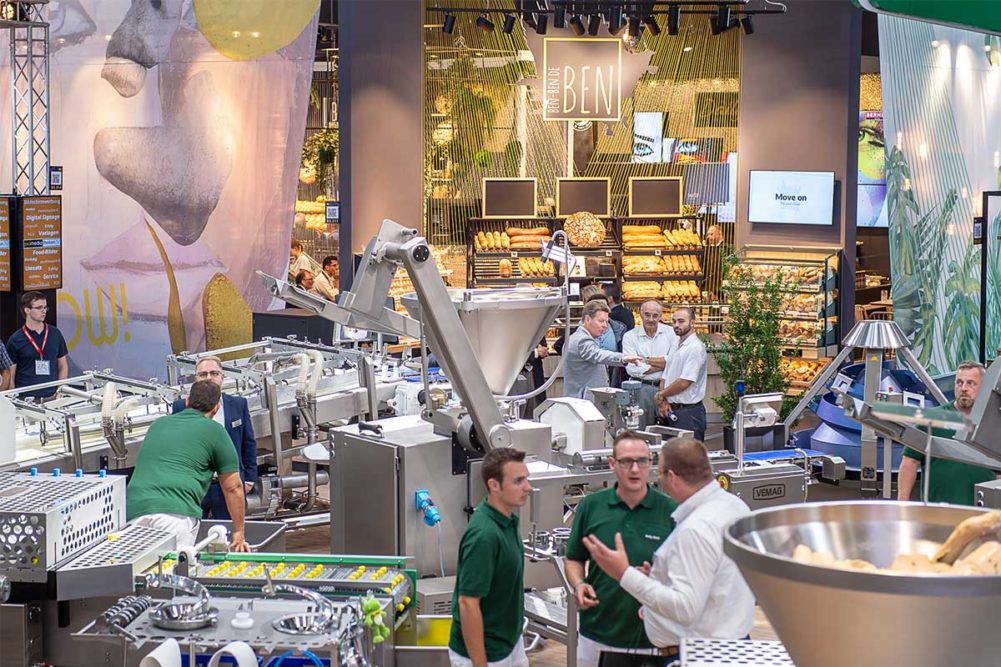It doesn’t matter if people live in England or New England, Paris or its smaller namesake in the Lone Star State. Those European shopping behaviors and the megatrends impacting the baking industry have a familiar ring to them, no matter what language is spoken.
Just look at today’s European consumer from the perspective of Michael Wippler, master baker and current president of the German Bakers’ Confederation, the official sponsor of the iba trade show, which is being held Oct. 22-26 in Munich.
“The new challenges are linked to the changed world of work. Customers are working from home more and going into the city center offices less frequently,” he observed. “Generally rising costs make people more sensitive to prices, so some customers will go without a slice of cake during the weekend. Customers are paying more attention to quality and also creativity. They appreciate bakeries that observe these criteria.”
Higher prices have hit some European pocketbooks hard, observed Andy Pearson, category and insight manager, Lantmännen Unibake UK, which is part of the Copenhagen, Denmark-based company with 36 bakeries in 20 countries.
“Grocery inflation is still running too hot for many people, around 17%, and is ahead of total UK inflation at 9%,” he said.
In response, Mr. Pearson said UK bakeries have to control their costs to attract shoppers who are changing retailers and where they buy groceries. Consumers are also lured by promotions, everyday low prices and discounts from coupons or retailers’ loyalty programs.
He added the so-called “lipstick effect” has many shoppers seeking out affordable, feel-good treats such as a strawberry tart or a fresh buttery scone from an in-store bakery to brighten their day.
From an operational perspective, European bakeries have been especially burdened by universal issues that are affecting the global industry.
“The shortage of skilled workers, supply chain issues and energy prices are also current, challenging topics in Europe,” said Fred Schandel, head of the export department, Kuchenmeister GmbH, Soest, Germany.
He pointed out the full-line producer of bread, sweet goods and traditional German baked goods is focusing on expanding recruitment activities, strengthening long-term relationships with its suppliers, adding renewable energy sources to lower overhead and investing in automation at its three wholesale bakeries throughout the country.
“The economy in Europe is still very much marked by the effects of the Ukraine war, which led to price increases and supply bottlenecks,” Mr. Schandel explained. “As a result, prices for baked goods and other foodstuffs have had to be raised by up to 70% in some cases. The bakery industry is mostly divided in this respect. Some companies have failed to pass on the price increases for energy and raw materials through increased store selling prices. These companies have now made up for this in 2023. In some cases, however, companies that made these decisions too late have also had to close. This applies to Germany as well as to the whole of Europe.”
He added those surges in prices from 2022 are gradually easing this year.
In the UK, Mr. Pearson observed, even retailers are struggling with labor and inconsistent supply chain issues, and in some cases, they’re cutting back on providing full service in the in-store bakery/deli department.
“Many stores are running lean with staffing, leading to the fresh counters being closed or uncared for during large parts of the day,” he said.
In the commercial bakery segment, packaging remains a huge area of focus for the industry in Europe and the Americas, observed Dennis Gunnell, president of Formost Fuji and chair of the International Task Force for the International Baking Industry Exposition (IBIE). The American Bakers Association and BEMA will host the IBIE Lounge, which will be a gathering place for the North American baking industry at iba 2023.
“We’ve been able to automate so much of the processing from ingredients handling to mixing and baking, but everyone wants increased operational flexibility to meet market demand,” Mr. Gunnell said. “Robotics in packaging reduces dependence on manual labor to put the product in the package and provides that increased flexibility.”
Bakeries are also relying on automation to shift employees to those positions where they can make a higher-value contribution to the workflow, noted Jorge Zarate, chairman of IBIE 2025 and global senior vice president of operations and engineering at Mexico City-based Grupo Bimbo, which has a strong presence in the European market and globally.
“I see automation in terms of eliminating those frontline positions that are too repetitive and not adding value to the product,” he said.
During his global travels, Mr. Zarate also has observed more investment in the Industrial Internet of Things, and he expects various forms of artificial intelligence will allow bakers to gather more useful information from their equipment and processes to improve productivity, product quality and customer service.
In today’s interconnected world, bakers have more in common than ever, no matter whether they live in Athens, Greece, or Athens, Ohio. A focus on regional innovation and advancements in technology allows the global baking industry to persevere for the foreseeable future.
This article is an excerpt from the September 2023 issue of Baking & Snack. To read the entire feature on Bakery Express, click here.





